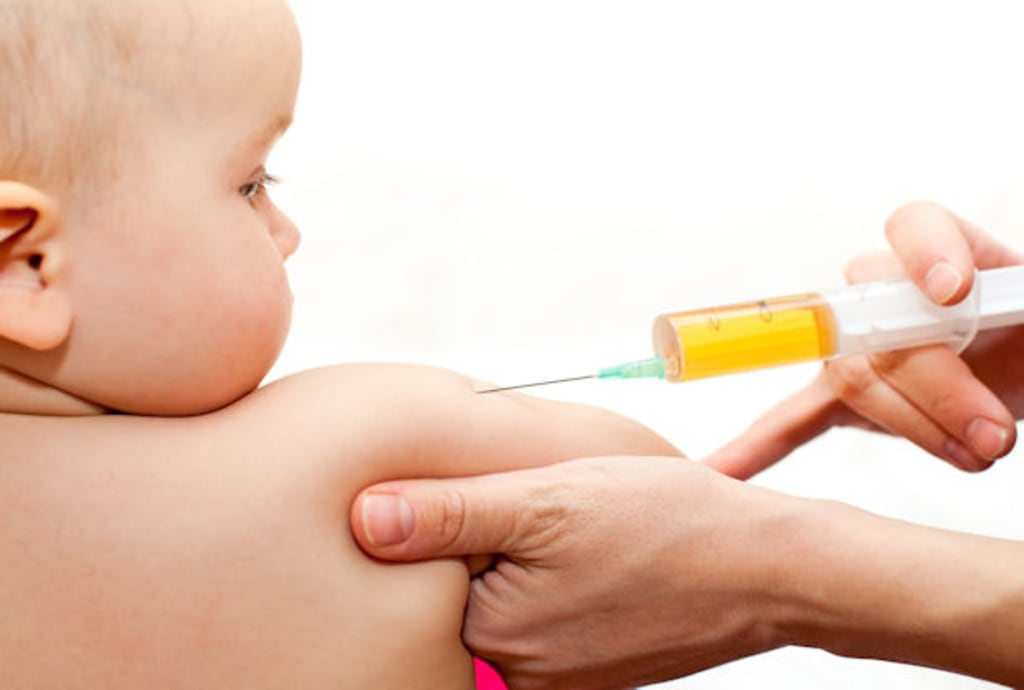Vaccines... To Jab or Not to Jab?
Make an informed decision on whether to vaccinate your children

I was recently on Facebook when I came across a post from an irate mother whose child ended up in hospital care as she came into contact with another child who had not been vaccinated against chicken pox. The young girl who ended up in the hospital also had not been vaccinated as during the time she was scheduled to have the vaccination herself she was immune-suppressed and on medication from a kidney transplant; therefore having the vaccination would have given her the illness and made her susceptible to reacting to it very badly. The mother of the child used the word "smartass" to describe parents who do not allow their children to be vaccinated or believe that vaccinations are something that is the choice of the parent and if the child is truly safe from the illness through this procedure then they have nothing to worry about if another child is not vaccinated. I am neither agreeing nor disagreeing with this statement, I am simply highlighting the facts surrounding the pros and cons of this jab or not to jab conundrum to help provide informative advice and facts so you can make a decision that is right for you and your child.
Some people believe the pros of vaccines are: that having an inactive or "dead" version of the virus injected into your body can help your body recognise an imminent attack if such illness should return and be able to fight it much quicker and efficiently than if this was your first contact. It does this by stimulating your immune system to react to the vaccine as if it was the real version of the illness. Your immune system remembers the "code" of antibodies used to fight the virus which in turn makes the virus more easily defeated if it returns.
However, some people believe that certain chemicals used in the manufacturing of vaccines are harmful or even deadly and may be linked to some children developing autism. They also believe that by having the vaccination it will do more damage to the immune system as its job is to fight disease and virus; therefore if you inject something into the body to take over the immune system's job it can make the immune system weaker. In other words, it can make the immune system lazy and less capable of fighting diseases and becomes reliant on these vaccines to defend the body rather than the immune system itself.
I have done some done some research on my own and these are some of the main facts:
According to the NHS website, the main ingredient in a vaccine is the vaccine antigen, which is the inactive form of the virus. There are two types of vaccine: a killed vaccine, which is an illness which has been destroyed by chemicals or heat which inhibits the virus's ability to mutate in the body and make you sick but it is still functioning enough to encourage a reaction from your immune system and produce the correct antibodies. This type of vaccine produces only a small response in the immune system which is the main purpose of a booster injection as a sort of top up to ensure your body remembers the virus. Examples of these kinds of viruses are the flu jab and the polio vaccine. The second type of vaccine is a live vaccine, which has been weakened in the lab so they can still mutate to produce a strong reaction from your immune system. There is no need for a booster jab for this one as the response from your immune system is so strong it can give protection for the rest of your life. The MMR vaccine (measles, mumps, and rubella) is an example of this type of vaccine.
You should always make sure you ask for a patient information leaflet about a vaccine before you make a decision for your child to have the vaccine. It has a list of ingredients which are used in the production of the vaccine even though the NHS claims that some ingredients in the list have been removed after production. If you are interested In any vaccines ingredient list here is the link to a helpful website where you can type in the name of the vaccine and the brand and find it yourself.
Another ingredient used is called Thiomersal which is also known as mercury. It is used to make sure bacteria and fungi do not grow on the vaccine. In high quantities, this substance is poisonous to the brain but the World Health Organisation claim that the levels in vaccines are not high enough to poison anyone; but a question you have to ask yourself is how can you be so sure..? Here is a link to WHO's full statement on the matter. This is the ingredient in vaccines which there have been concerns can cause autism. This preservative is apparently no longer used in vaccines for babies and children vaccinated under the NHS.
Another ingredient is something called an adjuvant which increases the effectiveness of the vaccine and means that less of the antigen (the illness) can be used in the vaccine. Again it is claimed that the amount used in vaccines is safe and the only side effect is redness and a small bump around the injection site. The adjuvant used in vaccines is aluminium based which again is another substance that in high quantities can be harmful; it is claimed that low quantities are used but again who is policing this to ensure this is the case and how can we as parents guarantee that our children are safe?
Pork gelatine is also used as a stabilising agent to protect the vaccine from damage from temperature changes and increase shelf life. Only the MMR vaccine and the shingles vaccine are known to have this agent inside. This sparks another issue as certain religions do not wish to partake in pork products in any kind of way so it is important to make sure if this applies to you that you are in the know about what vaccines contain pork gelatine. There are also people who have allergies to gelatine so again, check, check check!
They also include a substance found in Human blood called Human serum albumin, it is again used to stabilise the drug and increase the shelf life; this is found in the chicken pox vaccine. There are two vaccines which contain protein from eggs and certain vaccines are grown on cells from egg embryos or grown on the hen's eggs itself. Again ensure you are comfortable with this or that your child does not have an allergy to eggs before you agree to the injection.
Formaldehyde is also using the production process and can be harmful in high concentrations. It is said to be diluted out after its purpose has been served but again think about whether you can guarantee that it is diluted and whether this procedure is policed and checked thoroughly, you cannot guarantee this so take that into consideration. Also, bear in mind it is found naturally in the bloodstream also but obviously at levels which are safe.
The last ingredient is antibiotics which is used to kill bacteria on the vaccine. The MMR vaccine has small amounts of an antibiotic called neomycin which can cause a reaction; this is something also to bear in mind. If you would like more information about any points raised in this article you can refer to the website which I sourced my research from.
In my opinion, I will not be vaccinating my child as I believe the immune system has a job to do and should be left to do its job and that interference can cause the immune system to not work as efficiently as it should.
I also feel that the amount of medical scandals you see on a regular basis to do with the medical industry does not allow me to put my full trust into the industry. In terms of policing the way these poisonous substances and chemicals being used in the vaccines and just because they say they ensure its low levels of these chemicals, I believe that does not mean I can take their word for it.
I also am not comfortable with pork gelatine being used in the vaccines as I do not eat pork for my own reasons and I also feel that I am not comfortable with animals being used to help culture these vaccines.
I also do not find comfort in the fact that they are taking a substance from another human's blood and injecting that into my child... who is this person and why would I want a piece of someone else inside my body...? :/
Finally, I feel that antibiotics are being overused and this is how you end up with antibiotic-resistant viruses and illness such as MRSA and once you begin over ingesting or using these products, when you actually need it, it won't work or you point blank cannot use it because your body is desensitised to it.
In conclusion, I feel everyone is entitled to make their own choices about this matter as it is really dependent on the personal opinion of the person and no matter what you choose to do I don't think anyone should make anyone feel a type of way for their decision. If you are worried about your immunised child being around children who haven't been vaccinated for infectious illnesses then everyone should ensure you have encouraged your children to practice proper hygiene such as covering their mouths when they cough or sneeze, washing their hands and not sharing drinks with other children. This should help in ensuring your children do not catch anything from another child.





Comments
There are no comments for this story
Be the first to respond and start the conversation.